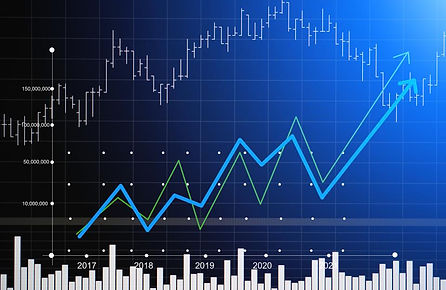


EQUITY Trading and Investment.
Equity investors purchase shares of a company with the expectation that they’ll rise in value in the form of capital gains, and/or generate capital dividends. If an equity investment rises in value, the investor would receive the monetary difference if they sold their shares, or if the company's assets are liquidated and all its obligations are met. Equities can strengthen a portfolio’s asset allocation by adding diversification.
Benefits of Investing in Shares
1. Stocks Outperform
2. Many Stocks Pay Income
3. Stocks Have High Liquidity
4. Stocks Allow for Greater Diversification
What are the Risks
Investing in shares, like any investment, comes with a certain amount of risk. Shares are often described as 'high-risk asset classes' when compared with other types of investments. The primary risk of investing in shares is that it can result in loss of capital. Unexpected events outside of your control or negative developments within the company can significantly affect share prices and the value of your portfolio. In saying that, this is not to scare you away from investing in shares, but merely a necessary understanding that all investors must have
Capital Market and Its Types
Capital market is referred to as a place where saving and investments are done between capital suppliers and those who are in need of capital. It is, therefore, a place where various entities trade different financial instruments.
There are two types of capital market:
-
Primary Market
-
Secondary Market
Capital market is where both equity and debt instrument like equity shares, preference shares, debentures, bonds, etc. are bought and sold.
Functions of Capital Market:
-
It acts in linking investors and savers
-
Facilitates the movement of capital to be used more profitability and productively to boost the national income
-
Boosts economic growth
-
Mobilization of savings to finance long term investment
-
Facilitates trading of securities
-
Minimization of transaction and information cost
-
Encourages a massive range of ownership of productive assets
-
Quick valuations of financial instruments
-
Through derivative trading, it offers insurance against market or price threats
-
Facilitates transaction settlement
-
Improvement in the effectiveness of capital allocation
-
Continuous availability of funds
The capital market is the best source of finance for companies. It offers a spectrum of investment avenues to all investors which encourage capital creation.
Stock Market Index
The stock market index is a statistical measure that shows changes happening in the stock. Now you may have a question, how is the index created? Similar kinds of stocks are picked from already listed securities on exchange and are grouped together.
The criteria for stock selection can vary on:
-
Type of industry
-
Market capitalization
-
Size of company
Its value is computed using the values of the underlying stocks. Any change in the underlying stock prices impacts the overall value of the index. There are two scenarios- if the price of most underlying assets increase, then the index will increase whereas if the prices of most underlying assets decrease, then the index will decrease. This is the way the stock market index reflects the overall market sentiments and the direction of price movements.
Questions like what is index in the stock market may come to your mind? Let’s have a look at it and know why it is required.
The stock market index acts like a barometer that shows the overall conditions of the market and also facilitates the investors in identifying the general pattern.
List of notable Stock Market Indexes in India:
-
Benchmark indices: NSE Nifty and BSE Sensex
-
Broad-based indices: Nifty 50 and BSE 100
-
Indices based on market capitalization: BSE Small-cap and BSE Mid-cap
-
Sectoral indices: Nifty FMCG and CNX IT
The indexes are required due to the following reasons:
-
Aids in Stock-Picking
-
Acts as a Representative
-
Parameter for Peer Comparison
-
Reflects Investor Sentiment
-
Helps in Passive Investment
How index value is calculated?
The value depends on the weighted indexes which are:
-
Price weighted index: In this method, index value is calculated on the company’s stock price and not market capitalization. The stocks with high prices have high weightage in the index than stocks with low prices.